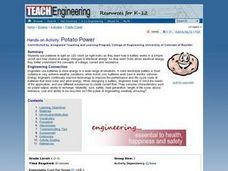Curated OER
Life Unplugged
Students explore renewable and non-renewable energy sources, discuss how each source was created, and identify and sketch out the cycle of energy for each renewable source.
Curated OER
An Eclipsing Binary System with a Precessing Accretion Disk
Young scholars work together to complete an experiment over binary sources. They determine values for the orbital period of certain objects and interpret intensity changes. They also calculate a value for the period of precession of an...
Curated OER
Population Dynamics of Growth of Drosophila
Students experiment with Drosophila to determine if density of female flies, food sources, temperature and light affect the population dynamics of growth. Students graph their data and compare their results to the number of human...
Curated OER
Population Dynamics of Growth of Drosophila
Students investigate population dynamics such as variation in density of females, composition of food sources an environmental factors such as light and temperature on Drosophila. They then relate their findings to human populations and...
Curated OER
Earthquake Waves
Fourth graders pour three cups of sand on the top of a plastic table near the edge. They tap the table lightly with the rubber mallet. When they tap the table lightly they see the sand ump into the air.
Curated OER
Jell-O Optics
Students observe an activity with Jell-O to learn about optics. In this investigative lesson students fill out a handout on the activity that helps them to investigate the index of refraction and the speed of light.
Curated OER
Microscopes and Crystals
Students observe crystals under the microscope. In this science lesson, students compare how the crystal look like using their eyes, hand lens and microscope. They identify the type of crystal based on the amount of light they allow to...
Curated OER
Sound and Hearing - Internet Research
Young scholars use a website to help them recognize that sound is generated in a variety of ways and from different sources. They determine that sounds vary in tone and loudness, and learn there are different ways to describe sound.
Curated OER
Circuits and Conductors
Pupils participate in an online lesson to explain the conductivity of different materials and the effect of changing the power source.
Curated OER
Gonna Take a Sedimentary Journey
Students collect water samples from a local source, test it, filter it and identify the materials suspended in it. Students disucss the possible sources of sediment in their watershed.
Curated OER
Trash...it really piles up!
Students investigate a contemporary "midden" by analyzing trash collected from various sources and determining life-style choices people make. They see that reducing the amount of waste we generate is helpful to the the environment.
Curated OER
Monitor Marine Migrants
Students, in groups, track the seasonal journey of a species, such as a shorebird, sea turtle, or marine mammal, using various sources of migration data
Curated OER
Energy Transfer
Young scholars investigate the properties of heated air. They make predictions about what they think makes the wind blow on a worksheet, and conduct two experiments to demonstrate the properties of heated air. Students heat a bottle...
Curated OER
Air Pollution: A Local and Global Problem
Young scholars work together to solve the problem of air pollution. Using the Internet, they research the pollution problem in one city. Using the data, they develop their own solution and pitch it to the class. They must identify the...
Curated OER
Observing Bursts from an X-ray Burster
Students study the use of X-ray data to make size and energy estimates of the source and the processes occurring there. They use XTE observations of the object GRO 1744-28 to determine whether bursts occur periodically and the duration...
Curated OER
Colored H2 Balloon Explosions
Students perform an experiment in which they put different types of salts in a balloon, fill it with hydrogen gas, and ignite it. The electrons in the salt molecules are excited by the heat and release energy in the form of light. ...
Curated OER
Making a Battery
Fifth graders make a battery. In this physical science lesson, 5th graders word in pairs make the battery. Students follow 4 steps to create the battery.
Curated OER
Density of Glass Fragments
Students explore how the density of an object is determined and determine what a "physical property" is. They demonstrate how science can be applied to police work.
Curated OER
Our Universe: Always Moving, Always Changing
Students explore the main concepts of astronomy through the eleven lessons of this unit. The past, present, and future methods of studying the science are examined in this unit.
Curated OER
Meteorology Word Search Puzzle
In this science instructional activity, students look for the words that are related to the theme of the instructional activity. They also work on the skills of spelling and word recognition.
Curated OER
Is Your Blue Really Blue? [Metamerism]
Students examine color perception and how it relates to metamerism. In this color lesson students complete a lab activity that shows them the three basic components of color perception.
Curated OER
Chemiluminescence
High schoolers explore chemiluminescence through various experiments. In this chemistry lesson, students explain the chemical reaction that drives the process. They give real life applications of chemiluminescence.
Curated OER
Chemical Sleuthing
Students engage in a instructional activity which includes flame tests and the construction of a simple diffraction spectrograph with which to measure sodium ion emissions. They use the Bragg equation to compute the wavelength of the...
Curated OER
Potato Power
Learners light a LED clock or light bulb using potatoes. They examine how a battery works in a simple circuit. They determine how chemical energy changes to electrical energy while experimenting with potato powered circuits.



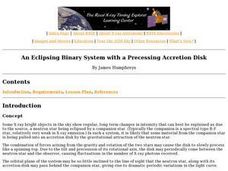
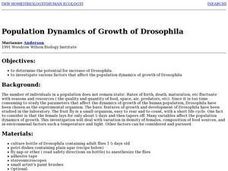














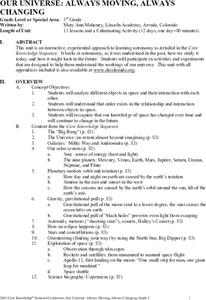

![Is Your Blue Really Blue? [Metamerism] Lesson Plan Is Your Blue Really Blue? [Metamerism] Lesson Plan](http://content.lessonplanet.com/resources/thumbnails/299613/large/otq2otizlmpwzw.jpg?1315624134)


